Tea Culture Blooms in Cambridge and London Universities: A Taste of China, A Bridge to the World
2024-11-22 11:19:37 by SICC
Tea culture, as an integrated cultural system, often embodies the unique lifestyles and spiritual pursuits of different nations and regions. In the summer of 2024, two events—the “Tea and Qin Music Yaji” at SOAS, University of London, and the “Cambridge Garden Tea Gathering” at King’s College, Cambridge—celebrated the fusion of guqin music, poetry, arts exhibition, and Chinese tea ceremony, offering people from around the world a glimpse into the distinctive cultural phenomena of the East, and fostering intercultural understanding.
The “Tea and Qin Music Yaji” was a special event of the 2024 London International Chinese Music Festival, held both online and in person. It drew many musicians, cultural scholars from China and the UK, and enthusiasts of Chinese music and tea culture. Tea expert Hong Yiyuan created an immersive experience by pairing qin music and tea from different regions, building a global platform for qin aficionados. Dr. Yu Cheng, pipa and guqin player and founder of the London Youlan Qin Society, remarked, “This gathering, which connects friends through qin and tea, is widely cherished by qin enthusiasts in the UK and beyond. It reflects the boundary-crossing power of music and highlights the charm of Chinese tea culture integrated with music.”
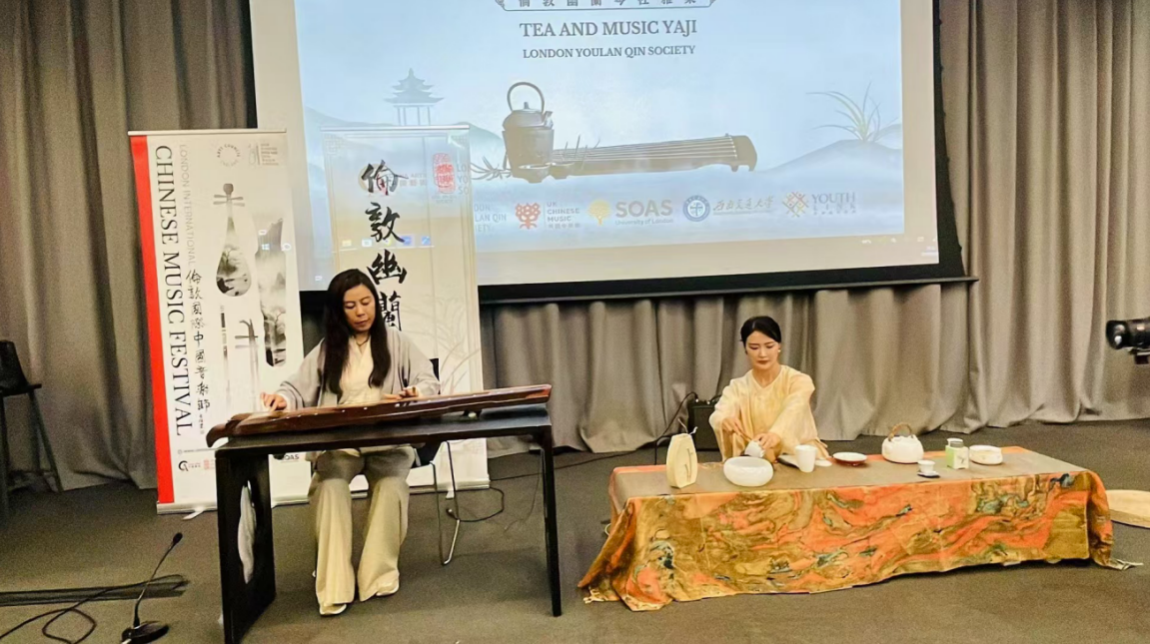
2024 London International Chinese Music Festival - Tea and Qin Music Yaji
(Photography/Liu Wenfei)
The tenth anniversary of the Cambridge Xu Zhimo Poetry & Arts Festival took place at King’s College, Cambridge, opening with a Chinese tea ceremony alongside an art exhibition entitled “Love and Imagination: Courtyards and Wilderness”, harmoniously blending Eastern and Western cultures.
Against the backdrop of the Victorian garden filled with exotic blooms, Peter Cavaciuti, an Italian-born East Asian painter and tea master residing in Cambridge, and his student Xizi demonstrated the techniques of Chinese Song dynasty matcha. In addition, Ms. Sophie Song, a psychologist and tea master, showcased the brewing techniques of green and red teas. Her graceful and insightful narration, paired with her fluid movements in the tea-making process, fully captured the allure of Chinese tea culture.
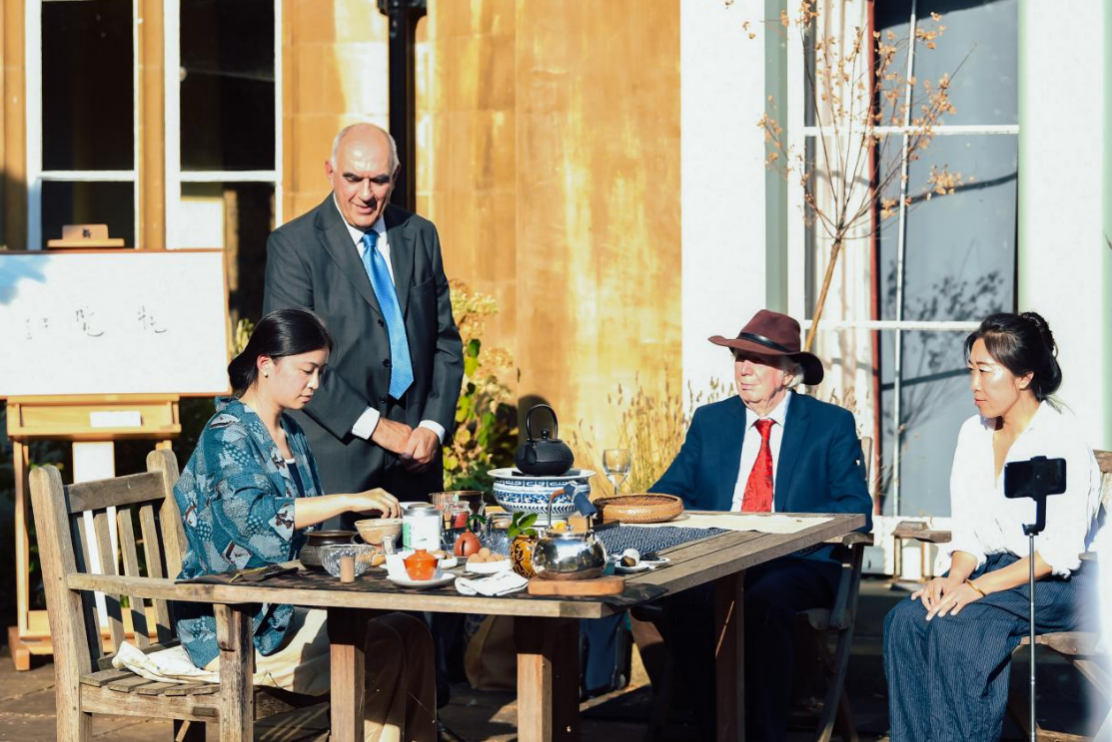
Peter Cavaciuti and his student Xizi are preparing matcha from Song dynasty .
(Photography/Shen Yingqi)
At the event, Professor Alan Macfarlane, Chairman of the Cambridge Xu Zhimo Poetry & Arts Festival, Fellow of the British Academy, and Professor of Archaeology and Anthropology at Cambridge, delivered a speech where he shared insights from his work Green Gold: The Empire of Tea. He explored tea’s impact on global history, trade, and culture, emphasizing how a single leaf has shaped world culture and economies in remarkable ways.
As one of the founding and co-hosting institutions of the Cambridge Xu Zhimo Poetry & Arts Festival, Media invited Professor Alan Macfarlane, Peter Cavaciuti, and Song Xi for interviews to discuss tea’s global influence and its essential role in East-West cultural exchanges.
Professor Alan Macfarlane: "Green Gold"—A Cultural Ambassador Linking China and the UK
Media: When did you first develop a connection with tea?
Professor Alan Macfarlane: When I was about three years old. I moved at the end of the Second World War with my parents to a tea estate in Assam where my father was a manager of the planting of tea. So from my birth, almost, and certainly from that time, tea was in my blood because all around me were tea pickers and tea factories and tea, tea, tea. That's the beginning of my acquaintance with tea.
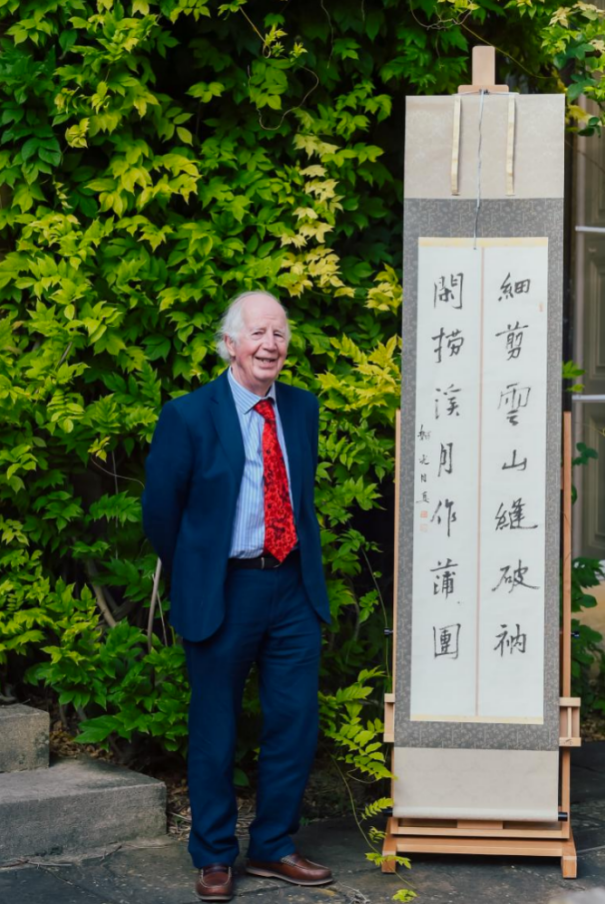
Alan Macfarlane
(Photography/Shen Yingqi)
Media: Your book “Green Gold: The Empire of Tea” has been translated into multiple languages. Could you tell us more about it?
Professor Alan Macfarlane: My book Green Gold: The Empire of Tea, the title Green Gold is because tea is green, but it's worth gold. It's more precious than gold. When it was shipped from China, for example, because it's very light, it's actually more valuable than gold.
Tea has had more effect on human beings than any other plant in history probably, except possibly rice or maybe potatoes. It is drunk by more human beings than any other drink. It's drunk more than any other substance other than water. And if it was just a leaf dropped into hot water, it wouldn't have had the kind of significance it has.
Firstly, the leaf itself contains more than 500 different chemicals, and they've only discovered what two or three hundred of them do. But what they did discover a long time ago, 150 years ago, was that tea contains something called tannin, and tannin is what doctors call phenolics. Phenolics are the most powerful way of killing dangerous bacteria. So when tea spread, for example, to Britain, it revolutionized the death rate. And in the 18th century, the deaths began to fall both in the cities, which before always cities killed people. They fell there and elsewhere. They fell among children and grown-ups. And so the British Industrial Revolution was made possible by tea. Tea didn't cause it, but without tea we could not have had an industrial revolution. And without the industrial revolution, we wouldn't be here.
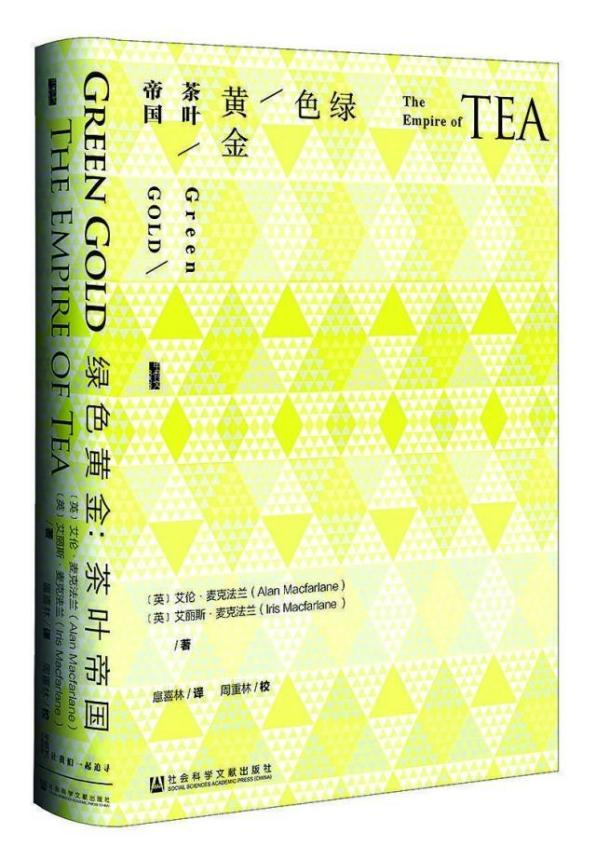
Alan Macfarlane’s book “Green Gold: The Empire of Tea”
Media: This year marks the 10th anniversary of the Cambridge Xu Zhimo Poetry & Arts Festival. As a co-founder and chairman of the festival, what do you think is the significance of this event for the local community and for China?
Professor Alan Macfarlane: These tea events and Xu Zhimo festivals, as well as much else, have allowed me to make friends with many Chinese, and they come here, and then we go back to China. That is part of one of the great events of my last 20 years, which is getting to know China.
More than half my friends now are Chinese. And I've come to appreciate how much I like the Chinese. We discuss many things, and of course, they always give me gifts of tea. So I have a large collection of wonderful teas. And we go to the tea countries, among others, to the Dragon Well tea, north of Hangzhou, to Pu'er tea in Yunnan and Mendding Mountain Tea.
The garden in King’s College is very beautiful, and filled with roses. It's a very traditional English garden, with climbing plants and apple trees. It's something like a garden in Alice in Wonderland. It just feels like that. Then suddenly to transform it into an international garden, because you are having a tea event, adds to the magic of it. On this occasion, there were two different types of tea ceremony. Tea has always promoted exchange because if you love the products of another country, it will probably mean that you might become interested in it. You appreciate that these people are producing something that is very worthwhile for you. It also promotes understanding because it's a very peaceful drink. That's why it also fits in with Buddhism.
Peter Cavaciuti: The Global Appeal of Chinese Tea Culture and Asian Traditions
Media: You regularly hold tea ceremonies and teach tea culture in Cambridge, and you founded the Cambridge Asian Society. Your students come from diverse backgrounds around the world, each working or studying in different fields. What do you think drives people with no Asian background to develop an interest in Asian tea culture?
Peter Cavaciuti: When I was teaching tea, I was teaching people from all over Asia. My Chinese students were doing very, very well. When we have a tea event, we always place poetry or scrolls in the alcove. They are generally from the Tang period, so they've got certain inscriptions."Yi qi yi hui”, one time, one meeting.
I've had some students for many, many years. Some of them come from martial arts background. Perhaps they've already studied Jiu-Jitsu or Aikido. Some have studied Tai Chi, that sort of thing. Some are professional, they're lecturers, they study aesthetics, one's a writer, one's a psychologist. Another one is a doctor. They have a whole group of different people. They're all linked in actually wanting to - not just find the pathway through tea, but an interchange as well.
We really hope to promote more people coming from China and Japan to develop more interest in tea within Cambridge, and the understanding of Asian culture through tea.
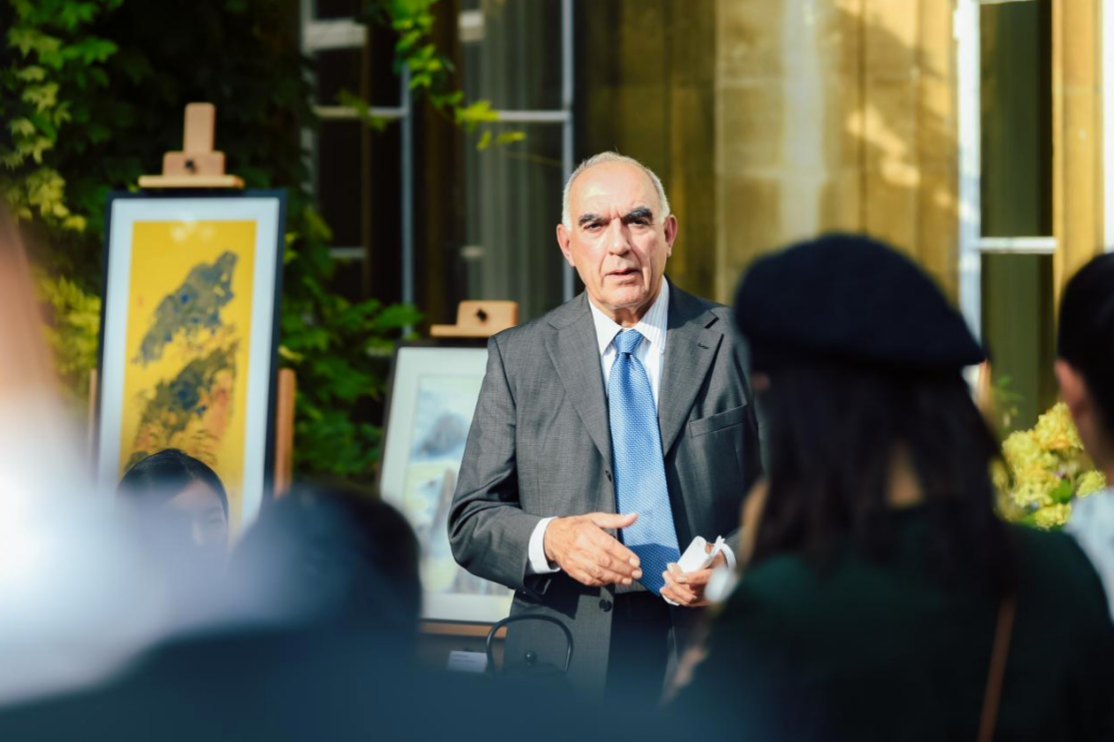
Peter Cavaciut
(Photography/Shen Yingqi)

